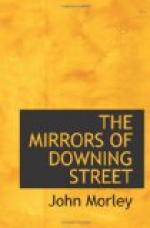It will better serve the main purpose of this book to suggest in what particulars the real greatness of this once glorious and finally pathetic figure came to suffer shipwreck at the hands of the politicians.
Lord Kitchener’s greatness was the indefinable greatness of personality. He was not a clever man. He had no gifts of any kind. In the society of scholars he was mum and among the lovers of the beautiful he cut an awkward figure. At certain moments he had curious flashes of inspiration, but they came at long intervals and were seldom to be had in the day of drudgery, when his mind was not excited. On the whole his intelligence was of a dull order, plodding heavily through experience, mapping the surface of life rather than penetrating any of its mysteries, making slowly quite sure of one or two things rather than grasping the whole problem at a stroke.
But there was one movement in his character which developed greatness and by its power brought him to wonderful success and great honour; this was a deep, an unquestioning, a religious sense of duty.
He started life with a stubborn ambition. As he went along he felt the lightness of duty, and married his ambition to this Spartan virtue. He remained in most respects as selfish a man as ever lived, as selfish as a greedy schoolboy; nevertheless by the power of his single virtue, to which he was faithful up to his last moments on this earth, he was able to sacrifice his absorbing self-interest to the national welfare even in a political atmosphere which sickened him at every turn.
You may see what I mean by considering that while he longed for nothing so much in later life as the possession of Broome Park, and that while his selfishness stopped hardly at anything to enrich that house with pictures, china, and furniture, and that while he would shamelessly hint for things in the houses of the people who were entertaining him, even in the houses of his own subordinates, until the weaker or the more timorous gave him the object of his covetousness, nevertheless for the sake of his country he clung to the uncongenial chair in Whitehall, not merely working like a cart-horse for what he considered to be his nation’s good, but suffering without public complaint of any kind, and scarcely a private grumble, all the numerous humiliations that came his way either from his own colleagues in the Cabinet or from a powerful section of the newspapers outside.
I remember hearing from the late Mr. John Bonner, a most admirable artist in many fields, an amusing account of an interview with Lord Kitchener which illustrates the Field-Marshal’s passion for his Kentish home, and also sheds a telling light on the aesthetic side of his character.
Mr. Bonner had been recommended to Lord Kitchener, who wanted amorini scattered about the leafy gardens at Broome. Drawings were made and approved: a few months afterwards the amorini were set up in the gardens.




